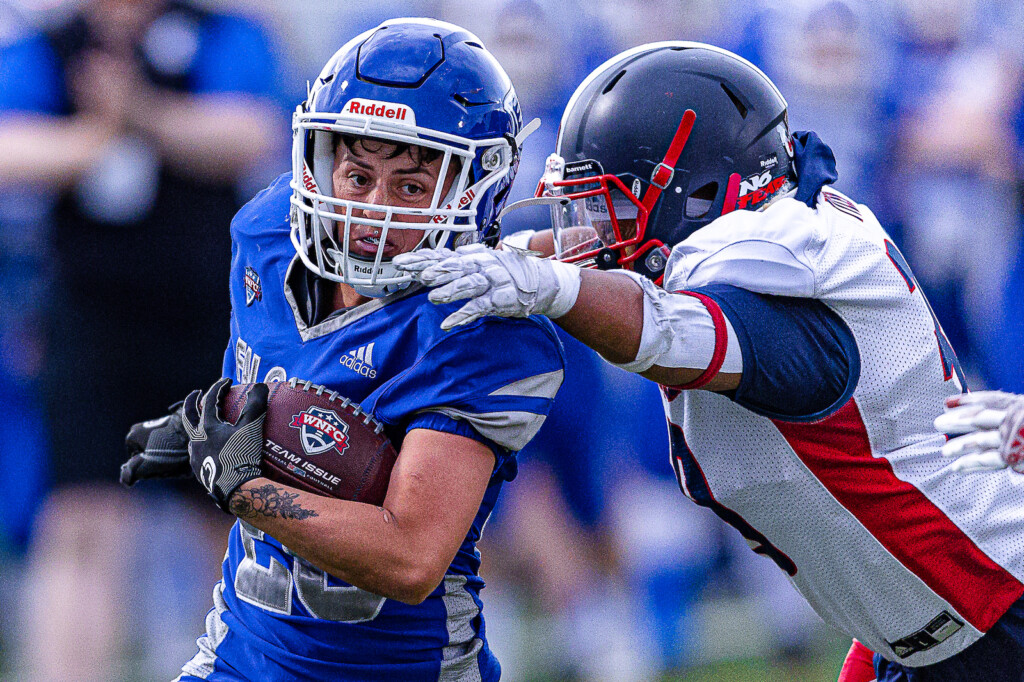Stereotyped roles of masculine and feminine do not lead to this scene. The crowd cheers, watching football under the lights and the glow of setting sun at Skyline High School for the Western Conference play-offs. I wasn’t sure what I was going to find there. Would there be women in lingerie or powder-puff-style football for cheap entertainment? But that thought left my mind as the National Anthem was sung and the game began in traditional fashion. Except for potentially gentler tackles, this is American Football at its finest.
The announcer boasted, “In case you don’t know, the team is in their 8th season, with quite a winning streak at 76 to 9, and taking home 2 national championships. They are also the biggest team at 54 players and 12 coaches.”
They are one of the best in the country, and their specific program of inclusion and support ensures that.
I caught up with Laci Miller and she described the “the Falconz way,” where people of multiple backgrounds and careers, from construction to business, differing religions, moms with families, some who had never played a sport in their life, are welcome. “There is a spot for everyone,” she said. While many have diverse stories, quite a few report that “joining the Falconz saved their life.”
Miller came to Utah and was looking to connect and make friends. She showed up at a practice and the team outfitted her with gear. She had no other choice but to join, and she has never regretted it, settling into her new family here.
In the stands, I chatted with Cayleigh Blackwell, a former player. Her wife Amanda is playing on the field and looks back to make a heart with her hands. Cayleigh’s battle buddy also waves back. The battle buddies are a mentorship program within the team to help prepare and support newer members for the sport. Cayleigh says she wanted to play football as a high schooler and was jealous of her brother who played. She said she had a lot of aggression and always thought it would help. When she found the sport as an adult, she joked that when her coaches said to channel that aggression, she may have had too much therapy now.
Back in rural Utah, a sophomore girl on the wrestling team discloses that she was bullied in 8th grade for wanting to play football. Fortunately, on the Wasatch Front, there is a more accepted path for someone with that desire. The Utah Girls Tackle Football League has paved the way with multiple teams for 3rd through 12th grade. This is a pipeline to expose youth to the sport and give them the opportunities and skills to succeed. In addition, the Women’s Excellence 4 Life non-profit partners with the Falconz to support leadership, life-skills, financial education, and self-worth within their mission of supporting women in the community.
After half-time, I caught up with the Utah Wild, the Women’s Ultimate Frisbee Team who demonstrated Frisbee skills on the field. They look to the Falconz for advice on how to do what they are doing.
Erica Bindas, a founder and current board member, also echoed that the hardest thing is funding. As a 501-C-3, their focus is also increasing equity for competitive women’s sports through cultivating sustainable relationships with the community. Brooke Stanislawski, a founder of the team beams with pride that her grandma gets to watch her play on Youtube, and Mack Perkett, another founder, says that the visibility and merch (they have the coolest red-rock country inspired uniforms) makes being on a semi-pro team worth it.

Perkett recounts a phrase she once heard: “Men’s teams are built out of potential; women’s teams are built only after success is demonstrated.” She’s referring to the challenges that specifically force women’s teams to prove themselves before they are given a chance, financially and with space and legitimacy. The silver lining perhaps is that the way women’s sports teams and their communities work together to stay alive is nourishing and sustainable.
The sun has set over Mount Olympus and the lights bring a second wind to the summer air. I caught up with Camille Hein, a board chair, on the side lines. She echos that the biggest challenge is fundraising. When I ask how they fund the team, she jokes, ‘poly plates,’ and is mostly serious. Bake sales, top golf events, and other fundraising efforts provide the basics to run the sport.
As I leave, I run into KT Buffington, a middle school English teacher of the year and Roller Derby coach. She invited me to the Wasatch Roller Derby Junior League game in a few days. The Wasatch derby players will be fighting for their lives, she says, as some of them are graduating.






